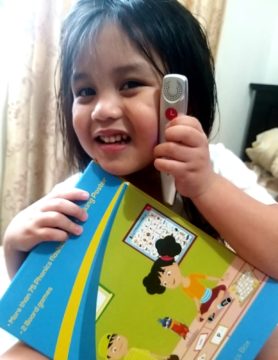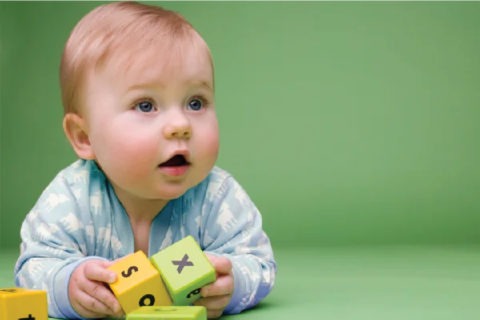
8 Ways to Introduce Alphabets to Your Child
December 10, 2020
What are The Benefits of Early Childhood Learning?
December 10, 2020Personality has a key role in every individual’s life. Every child is born with a distinctive personality. Learning about the correct personality development tips for kids becomes crucial.
Kids do not think like adults but yes, they definitely try to mimic you and your activities. They tend to adopt emotional, social as well as intellectual skills to behave like adults. Therefore, this process needs to be supervised very carefully.
What Is Personality Development in Kids?
There are many facets to a child’s personality, be it emotions, self-esteem, courage, confidence, and their behaviour towards others. You can notice these personality facets between the age of 1 year to 5 years among your kids. This process of adoption and transformation takes a lot of time, so remember to hold on to your patience. If you fail to do so, you will indirectly drop down your child’s potential to learn new emotional and social skills.
Thus, this period is marked important and recommended to groom your children with the right early childhood learning program.
Importance of personality development in childhood
’Personality’ is often mistaken as ‘appearance’. Hence, parents start focusing on their kid’s attire, health, and looks. They avoid emphasizing on the rest of the factors like social skills, knowledge, interpersonal skills, and much more that contributes to the construction of a balanced personality.
Here are ten things you can follow to develop the right personality in your child:
- Refrain Labelling and Comparison
Labelling is probably the worst thing you could do to your child. Labelling the child closes their options of correcting themselves. So, good or bad, stop comparing their behaviours with others around them. Encourage your child to express their individual personality. Never force them to imitate or be someone else. Avoid correcting them with words that will affect and clearly damage their self-esteem. Be cautious with your words. - Pay Close Attention
Today, social media is dominating and influencing your child’s behaviour. Pay close attention to your child’s online hobbies, activities, and movements. Keep a track of their interests and new habits they are adopting. Similarly, an early childhood learning program may cast an influence on emotional and intellectual skills. Therefore, if you want to uplift the confidence and curiosity of your child towards learning, gift him the best early childhood learning tools by Learning Time. - Be a Good Listener
Children love to talk and seek attention. But parents are often tied down by professional and social engagements, and unable to give enough time to kids. This often hampers confidence, and heightens a feeling of insecurity in kids. Start spending quality time with them and ask them to express themselves more. Indulge in interactions and knowledge sharing sessions. Sit and discuss their areas of difficulties and accordingly provide solutions to boost their confidence. - Review your Parenting Skills
Unnecessary pieces of advice and yelling at your children for their mistakes is going to worsen the situation. Gently and patiently explain to them the consequences of their wrongdoings and assist them in performing corrective actions. This will be the most effective way of bringing the desired change in their behaviour. Keep monitoring your own parenting skills, self-critique, and keep improvising. You can also reach out to Learning Time and check out the latest in parenting and home learning. - Limit Screen Time
One of the major concerns for parents today is the usage of gadgets. Due to the addiction to new-age gadgets, children spend less time interacting with the outside world. They are less used to social games, real-life events, and travelling. Teach them to value their surroundings, peers, and real activities around them. Limiting the time spent with gadgets will go a long way in improving the social and emotional skills of kids. - Chalk Out the Rules
Establish healthy communication and give clarity about their essential responsibilities. Comfortably tune them with the new set of rules and morals of life. This process will help to strengthen the bond between you and your child and also to understand their duties. Be proactive and take responsibility for your toddler’s misbehaviour and mistakes. Communicate, instruct, and fix wisely. Slowly but eventually, you will notice a positive transformation in your kids. - Be Gentle with their Shortcomings
Every parent wants their children to excel in a lot of things forgetting the fact that every child has their own shortfalls. Instead of burdening them with your expectations, identify their unique capabilities. Avoid being disappointed and provide gentle assistance to improve early childhood competence without lowering their confidence. Always keep realistic expectations from your kids and encourage them to excel in their areas of interest. Stop nagging about their shortfalls and continue to fuel their passion, and appreciate their strengths. - Model the Right Behaviour
Children adopt whatever they observe or hear. Make sure you portray a picture of kindness and maintain a positive outlook towards life. Learn to hold on to your anger and express the right emotions and tonality at the right time. This will not only help you in being a better citizen in society but will indirectly motivate your child to develop a polite and wiser personality. It’s important to practice what you say, and help your child find their first role model. - Encourage Independence and Socialism
We agree that it’s important to be caring and nurturing but at the same time, it is important to set your kids free to do whatever they want. Motivate them to perform and complete tasks with minimal difficulties. This will help them grow independent with essential skills and improve their sense of responsibility. Motivate your kids to play outdoor games. Take them to parks and recreational places, encourage them to socialize among their peers. This active participation in sports activities brings out their hidden personality characteristics. - Set a Good Example
This early childhood learning stage is very critical. During this phase, your child is more likely to mimic you, his teachers, his friends. You will need to be at your best behaviour and provide guidance through all their ups and downs. Learn to say “yes” whenever they need you to. Set an excellent example and be the ultimate support system for your child.
Therefore, the earlier you start investing in your child’s personality development program, the more you will help your child to develop.
Highlights of the Learning Time A+ Program:
The Learning Time A+ program has proved to be a blessing in children’s early education. The enticing illustrations, attractive content and audio-visual approach is bringing about a noticeable transformation in children between 0 to 5 years old.
Not just personality, our interactive “values series” has helped parents develop their child’s communication, vocabulary, analytical and cultural values.
Therefore, for their optimistic career prospects and better well-being, invest in the right resources of early childhood learning.
Inspire your kids by offering them the most amazing audio-visual early childhood learning products.
With Learning Time, reflect the natural philosopher within you!




